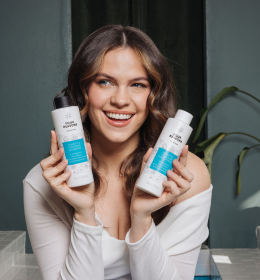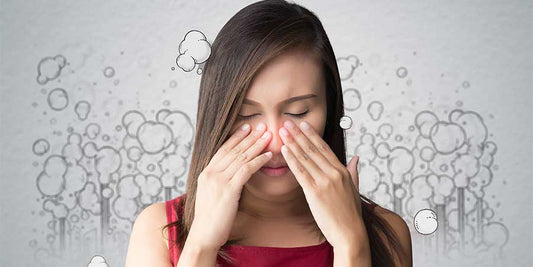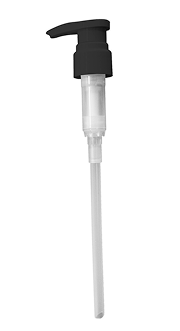Your first fragrance detox: The ultimate guide
Worried about the health risks associated with chemical fragrances? If so, you’ll be pleased to hear that you’re definitely not alone. According to the Global Wellness Summit (GWS), thousands of health-conscious men and women are now embarking on a full-on fragrance detox; ridding their bodies of synthetic scent chemicals, and trying to restore balance by opting for fragrance-free alternatives.
Question is, what’s the best way to detox? Do you need to ditch all of your old products? Do special diets help, or is it just a question of resting your body until all the nasties are gone? To answer these questions and guide you through your first fragrance detox, we’ve pulled together the following guide, featuring
- Advice on the best way to support your liver, and encourage your body to get rid of unwanted contaminants
- A full break-down on the best detox methods
- In-depth info on spotting hidden chemicals in your hair and beauty products
Keen to get started? Read on!
What’s wrong with fragrance chemicals?
First things first, we need to talk about the dangers associated with “fragrance”. At first glance, you might assume that the chemicals used to scent your favourite shampoo were completely harmless. Maybe even beneficial in some way. A lot of people think they come from flowers, or and there are a lot of common misconceptions about their origins.
Sadly, fragrance chemicals can be very dangerous. Most of them are custom-made in laboratories, using synthetic compounds like acetaldehyde, benzophenone or ethyl acetate
These chemicals are *known* to have negative side effects. In fact, a recent review conducted by the WVE found that over 1,200 fragrance chemicals should be flagged as a serious health concern because of their ability to disrupt your hormones; promote cancer or damage your organs.
Fragrance chemicals like are also known to be one of the leading causes of dermatitis, and many people find that their allergies are triggered by exposure to synthetic scent chemicals.
If you’ve ever noticed your asthma, migraines or respiratory problems flair up out of nowhere, it may well have been because of the fragrance chemicals lurking in your beauty products. It’s not just about the immediate or short term effects eithert. See, a lot of these irritating chemicals are fat soluble, which means that your body will store them up in your tissues every time they find their way into your bloodstream.
Over time, this can really start to take a toll on your health; building up a toxic load that your body struggles to shift, and encouraging the development of serious health issues.This is probably the number one reason to detox - particularly if you’ve been using scented beauty products for a long time.
Are natural fragrances any better?
The short answer? No. Longer answer? No, not at all. See, “natural” isn’t a protected term, which means that manufacturers can still hide all sorts of unpleasant chemical isolates under the monicker. It’s very common for big name brands to create a proprietary “natural fragrance” by mixing a blend of (heavily adulterated) essential oils and it is (very) important to note that no safety testing is done on the resultant chemical hodge-podge. It may be fine, but it’s equally likely to have all kinds of unpleasant side effects. There’s often no way of knowing ahead of time.
It’s also worth noting that some natural extracts are actually pretty toxic to the body in their own right. Limonene (derived from citrus fruit) might sound like a harmless alternative to other synthetic or chemical fragrances, but limonene is known to cause all sorts of allergic reactions, including:
- Skin irritation
- Migraine headaches
- Breathing problems
- Asthma attacks
So we’d recommend that you steer well clear of all fragrances, and focus on fragrance-free alternatives instead.
Starting your detox
Now that we’re all up to speed on the (many) dangers of fragrance chemicals, it’s time to talk detox. If you’re trying to clear your system of unwanted contaminants, the first thing you’ll need to do is move away from the hair and beauty products that contain those pesky fragrances.
This will help to reduce the strain on your body, and give your own internal detox systems a chance to start eliminating the toxins that have built up in your tissues.
Sadly, fragrance chemicals are found in a *lot* of things. Your hairspray, your shampoo and your favourite deodorant will all be loaded with them. You’ll them lurking in unexpected places too. According to the campaign for safe cosmetics, manufacturers sneak fragrance chemicals into
- Sunscreen
- Body wash
- Soap
- Body lotions
- Makeup
- Facial cream
- Skin toner
- Hair masks
- Exfoliating scrubs
- Makeup setting spray
- Dry shampoo
- Serums
- Styling sprays
- Hair gels and mousses
Whenever we detox, we start by gathering all of our toiletries together in one place, and combing through the ingredients list. You want to keep your eyes peeled for any mention of the word fragrance. You’ll also want to watch for any mention of
- Acetone
- Benzaldehyde
- Benzyl acetate
- Benzyl alcohol
- Camphor
- Ethanol
- Ethyl acetate
- Limonene
- Linalool
- Methylene chloride
This is because manufacturers are wising up to the bad press around hidden fragrances, and often try hiding these ingredients by using a different name.
And yes, we’d recommend that you bag up any products that contain some sort of artificial fragrance. Some people choose to throw away any and all contaminated items, but we know that a lot of people have invested a lot of money in their beauty collection so if you’d prefer to bag them up and set them aside for the duration of your detox - that’s fine too. The important thing is to make sure that you remove all fragrances from your routine at the very beginning of your detox.
How am I meant to survive without my beauty products?!
Of course, removing all the fragrance products from your collection will probably leave some pretty big gaps, so we’d also recommend that you look for some fragrance-free alternatives as soon as you possibly can. If nothing else, you’ll want to find a good fragrance-free shampoo and a fragrance-free hairspray or mousse. You may also want to look into fragrance free makeup and setting sprays.
Once you’ve settled on a few options, you’ll be pleased to know that you’re well on your way to a proper detox. In fact, you’ve done most of the work. All you need to do now is encourage your body to eliminate any unwanted toxins by
- Resting your organs
- Nourishing your body
- Getting plenty of rest
- Engaging in some healthy exercise
Read on to find out how, but first, a cautionary note on detox gimmicks...
Avoid detox gimmicks
If this is your first attempt at a fragrance detox, you might be tempted to try something like a juice cleanse, a detox tea or a diet that’s designed to help you get rid of unwanted toxins.
Thing is, your body doesn't really need much help with detoxification. Your liver, kidneys and lymphatic system are all custom-built to siphon off (and eliminate) dangerous substances like camphor, ethyl acetate or limonene. They’re incredibly good at their job too. Your kidneys clean over a gallon of blood every day, and the liver is capable of metabolizing thousands of different chemicals - including harmful carcinogens like benzophenone, or the phytates that are found in most drugstore shampoos.
Your body is a detox machine
In fact, your liver can actually convert toxins into water-soluble compounds that can be removed through your skin (via sweat) or your urine. And if a chemical substance somehow manages to evade the liver, there’s every chance that it’ll be picked up by your kidneys instead, or swept away by your lymphatic system.
And yes, it is true that these systems can get a little overloaded, especially if you’re using a lot of chemical-heavy beauty products. But if you can give your body a bit of a rest, your natural detox systems will be more than capable of mobilizing unwanted chemical contaminants.
Without the need for expensive remedies, fad diets or gruelling fasts.
Still not convinced? As luck would have it, the boffins over at the RIFM have actually published a couple of research papers on the subject: Showing that fragrance chemicals like linalool are normally metabolized by the liver in just 3-5 days. Assuming (of course) that your liver function is good, and that you’ve stopped exposing your body to the toxic substances found in a lot of modern beauty products.
Meanwhile, groups like Penn State University are very keen to stress the importance of a natural detox; warning that there’s no evidence to support the use of special teas, and pointing out that some special detox diets can actually be quite harmful. Particularly if they rob your body of essential nutrients, or put more pressure on your liver.
Give your body a helping hand
Speaking of putting too much pressure on your liver, it’s important to remember that your body’s natural detox systems can only filter so much junk at a time. If you overload them by eating fatty foods or drinking alcoholic beverages, there’s a very good chance that they’ll never get around to eliminating unwanted toxins - or reversing the damage caused by carcinogenic fragrance chemicals.
See, the body has evolved to prioritize immediate threats. It prefers to deal with highly toxic compounds like ethanol (from alcohol), ammonia or mercury before it starts metabolizing the chemicals that cause long-term cellular damage and yes, this is probably a good thing. In so far as our long-term survival is concerned, but it can get in the way of a good detox. Particularly if you are prone to snacking on junk food or drinking the odd glass of extra red.
If you want to make a success of your detox, we’d (strongly) recommend that you try to minimize distractions, and support your body’s natural detoxification systems by:
- Eating a good, clean diet
- Drinking plenty or water
- Limiting your alcohol consumption
You might also find that it helps to get more sleep, and keep your body moving but we’ll go into more detail on this below.
Eating healthy is key
Eating clean is probably the single most important thing you can do to improve your detox. A healthy diet helps to support liver function, and helps your body to burn through (and metabolize) the toxins stored in your fatty tissues. Question is, what do we mean by a healthy diet?
According to the Academy of Nutrition and Dietetics, the best detox diets include 5-8 servings of fruit and veg a day. You should also try to include a lot of cruciferous vegetables (think broccoli or brussel sprouts) and a good amount of natural vitamins too. For best results, we’d probably focus on eating things like
- Berries
- Artichokes
- Beets
- Collard greens
- Lemon
- Apples
- Ginger
- Garlic
- Onions
- Avocados
While avoiding toxic or harmful foods that are heavily processed, or rich in sugar. You could also try increasing your intake of fermented foods (think sauerkraut, kefir or pickles) because these delicacies also provide gut-friendly bacteria that help to encourage healthy elimination.
Speaking of which, fiber is another must-have. Partly because it helps to keep your gut moving, but also because high-fiber foods also tend to be packed with useful vitamins. Luckily, high-fiber foods are all around us. Check out this list if you’re looking for some interesting options, or just ramp-up your intake of whole grains and cereals if you’d prefer to keep things plain and simple.
Don’t forget to drink plenty of water
It also helps to drink plenty of water. Water is critical to and it also so try to drink at least 8-9 fluid ounces of good, clean water every day. If you’re not a fan of water, you could also try drinking lots of green tea.
Wondering why green tea is such a good choice? We’ll explain. Produced using unripe tea buds, this miracle drink is just as hydrating as water, but scientific research reveals that it *also* contains a boat load of beneficial antioxidants. These compounds are known to help neutralize harmful pollutants in your bloodstream, and they’re also thought to help support cellular detoxification, which means that green tea is the perfect choice for anyone that’s trying to purge themselves of fragrance chemicals. It tastes good too, which certainly doesn't hurt!
Get plenty of rest, and make time for exercise.
Last but not least, sleep and exercise. If you’re serious about ridding your body of toxins, exercise is pretty vital stuff. Whether you choose to work out in the gym, go for a run or take up cycling, the important thing is to get your body moving, and work up a bit of a sweat.
This is important because regular exercise helps to get your lymphatic system moving, and you need a fully-functioning lymphatic system to dispose of unwanted toxins. Exercise also increases blood flow to your tissues, which helps your body to access and break-down any chemicals that have accumulated over the years.
Just take care not to overdo things. After all, if you wear your body out, you’ll only slow down the detox process. According to the US Department of Health and Human Services, you should aim to do approximately 150 minutes of moderate exercise every week, but never more than 2 hours in any one day.
You’ll want to get plenty of sleep too. Sleep helps your body to recharge and it also supports your detox systems so try to get at least 8hrs a night. If you struggle to get 8 hours, you could also try napping throughout the day because research shows that any rest tends to help your body detox more efficiently, and our busy modern lifestyles can make it very hard to doze off in the evening.
Above all, try to take things easy and focus on your wellbeing. After a few days of detoxing, you should start to notice some changes but everyone is different, so it may take you a little bit longer to notice a shift. Try to stay patient and positive, and remember that every day without fragrances will be helping your body to move back into balance.


